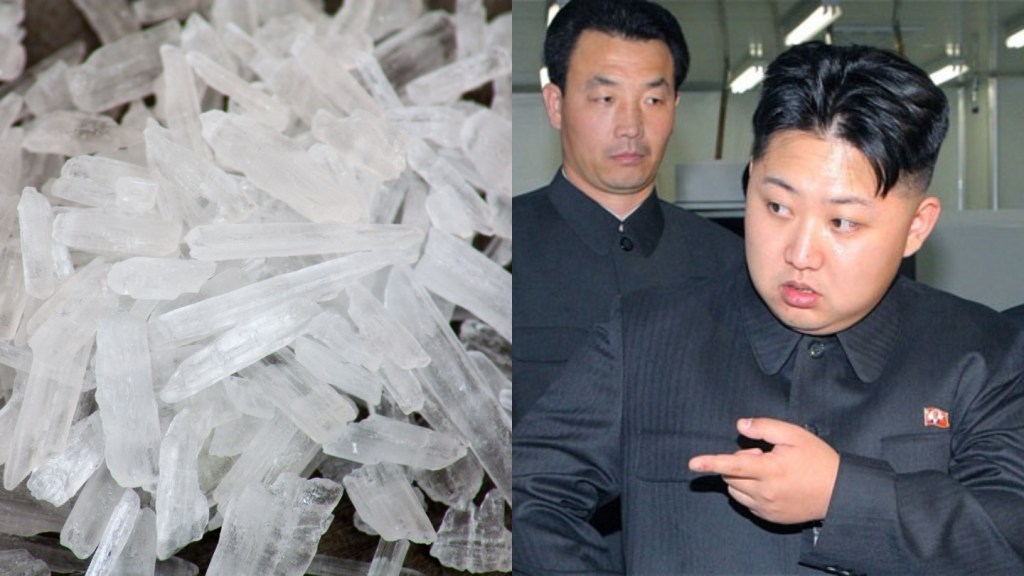For many, Lunar New Year festivities signify a chance to spend time with family, indulge in decadent feasts, and exchange some heartfelt gifts. Those gifts can vary from red envelopes full of cash right through to tea, clothing, or cans of spam. But for people in North Korea, it’s meth.
North Korean citizens have been giving crystal meth to one another as a gift, as part of a custom that’s becoming increasingly popular, according to The New York Times. “Pingdu,” as it’s known among locals—the Korean version of the Chinese word for “ice drug”—is apparently a popular present when it comes to birthdays, graduations, and “holidays such as the Lunar New Year.” And while the drug is illegal in the Democratic People’s Republic of Korea (DPRK), experts claim that people casually giving the gift of meth is more or less an open secret.
Videos by VICE
“Meth, until recently, has been largely seen inside North Korea as a kind of very powerful energy drug—something like Red Bull, amplified” Andrei Lankov, an expert on DPRK at Kookmin University in Seoul, told The New York Times. Andrei claims that stories of people giving each other crystal meth were common among defectors from the North. Users in the country are said to inject or snort ice as casually as one would smoke a cigarette—and many people in the impoverished country allegedly self-medicate with opiates and stimulants as a solution to the chronic lack of health care.
Reports of meth being a popular Lunar New Year gift in North Korea first emerged on Radio Free Asia—a US government-funded news outlet—last week. In that report, an anonymous source from DPRK told the publication’s Korean service that “Ice has become a best-selling holiday gift item” and that “most of the buyers are young people, even those still in middle school.”
“They usually buy ice to snort together during holidays,” the source explained. “They want to forget their harsh reality and enjoy themselves… Social stigmas surrounding drug use [have disappeared], so people now feel that something big is missing if they don’t have ice or opium prepared as a holiday gift.”
Neither VICE nor The New York Times could independently verify the Radio Free Asia report, but the information is easily squared with the opinions of multiple experts and researchers. Justin Hastings, a political scientist at the University of Sydney, said crystal meth has effectively become legal in North Korea “because officials take bribes to look the other way, and because the state indirectly benefits from a food chain of bribes that goes all the way to the top.”
Greg Scarlatoiu, executive director of the Committee for Human Rights in North Korea, further noted that the use and distribution of ice was not of major concern to Kim Jong-un’s regime. In fact, the habitual use of recreational drugs could potentially serve the government insofar as it might placate and subdue the people.
“For as long as drug use does not pose a challenge to the regime, but instead dulls the wills and minds of the North Korean people, the government tacitly allows it to go on,” says Greg. “Despite the tremendous mental and physical health challenges it creates.”
The North Korean government, meanwhile, firmly denies that its citizens use or even produce ice. In 2013, the North’s state-run news agency declared that “the illegal use, trafficking and production of drugs which reduce human being into mental cripples do not exist in the DPRK.”
But in 2003, the Nautilus Institute published a report revealing that “the North Korean regime has been involved in illegal drug production and trafficking since the 1970s” and that “these efforts increased in the 1990s as the country’s economic situation worsened… [and] heroin production was supplemented by methamphetamine production.”
Fairfax supported these claims in 2014, while noting that “the North Korean government has largely gone out of the drug business, according to the US State Department’s 2013 International Narcotics Control Strategy Report.” As government-sponsored meth production started to decline, many of the drug cooks likely redirected their skills and started selling to the local market: feeding citizens’ modern obsession with the substance. In that same article, Fairfax stated that people in North Korea commonly take crystal meth to treat colds, boost their energy, or keep them awake so they can work late. It also reportedly helps to stifle hunger—a useful function in a country where food is notoriously scarce.
“If you go to somebody’s house it is a polite way to greet somebody by offering them a sniff,” Lee Saera, of Hoeryong, told the newspaper. “It is like drinking coffee when you’re sleepy, but ice is so much better.”
Follow Gavin on Twitter or Instagram
Sign up for our newsletter to get the best of VICE delivered to your inbox daily.




